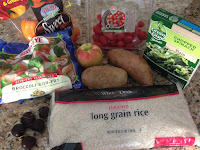Ketogenic Diet or Ke-NO-genic?
I'm revisiting the High Fat, Low Carb (HFLC) diet I started in April of 2014. Here's the post I wrote, detailing my personal reasons for switching to a low carb diet and my early results. After two years of eating low carb and high fat, I wanted to update and discuss once again the option of reducing carbs and increasing fat for overall health and performance.
I'm not a dietician, nutritionist or doctor. You are in control of your own health. Before making major changes to your diet or exercise, do your research, consult a doctor and be smart! I'm going to explain in simple terms my understanding of the fat vs. carbs argument.
Are Carbs Bad?
Maybe. What kind of carbs are we talking about?
 BAD = processed carbs (anything that comes in multiple packaging to preserve freshness)...
BAD = processed carbs (anything that comes in multiple packaging to preserve freshness)...
-cereal of any kind (don't fall for the "whole grain" or "organic" label)
-granola (check the ingredients-- even the organic variety lists sugar in some form as a primary ingredient)
-pretzels
-potato and tortilla chips (even the sweet potato variety)
-cakes, cookies, candy, etc. (yes, even those labeled "organic" or "all natural")
-juice (eat the whole fruit and get all the fiber and less natural sugar)
-smoothies (aka milk shakes)
GOOD = natural, whole foods...
-vegetables (fresh or frozen, low sodium canned only as a last resort... none of those special frozen with sauce added)
-fruit (fressh or frozen
-rice
-oatmeal (not the packaged kind)
-Quinoa
Carbs provide energy for the body, but can also cause blood sugar spikes, which trigger the release of insulin, which can also lead to your body storing fat. (This is my basic explanation of a very scientific process.)
Carbs add a variety to your diet and aside from just being a pleasure to eat, also add vital nutrients.
Is Fat a Better Fuel?
Maybe. Fuel for what? For shorter, faster, powerful events (sprints, most CrossFit WODs) the body relies on stored glycogen (which comes from carbs) for energy. For longer, endurance events, the body uses up those glycogen stores and then begins to tap into stored fat.
There's tons of info out there on the internet about the whole carbs vs. fat debate:
Endurance Planet
Ben Greenfield
Outside Online
Robb Wolf
My Personal Experience
Originally, I was quite happy. Well, let me restate that-- for the first few weeks I was miserable (emotionally speaking) at having to give up my carbs. I felt a little lost, and I wasn't quite sure how much I should be eating. I used My Fitness Pal to figure out how much fat I needed. After adjusting to the new food choices, I was quite happy. I didn't experience the common side effects-- loss of strength or bonking during WODs or other high intensity training. At least I didn't notice any performance negative effects. I didn't need to eat every 2 or 3 hours. Life was pretty good.
(WARNING: TMI) The first symptom I noticed was a change in my cycle. I had begun spotting midway through the month. At my yearly check-up, I talked to my doc, who told me this was most likely from a decrease in my estrogen.
At that same appointment, which was just over a year into the HFLC diet, my blood work revealed that I needed to up my thyroid meds. It seems my thyroid had become more sluggish.
Just short of two years in, my body seemed to crash. It's been a combination of factors-- added stress at work and in life, marathon training on top of my normal CrossFit and strength training, and probably the HFLC diet. I believe I had run my adrenals into the ground.
I've just recently listened to this fantastic podcast from Endurance Planet on the Dangers of Ketogenic and Low Carb Diets and Why Women are at a Higher Risk. And I heard that women who have thyroid problems should not go on a ketogenic diet. Oops. Now, I wasn't ever truly ketogenic. But even keeping carbs between 50-100 grams wasn't making my body very happy.
I'm adding back carbs, thoughtfully, keeping to the Zone percentages (40% carbs/30 fat/30 protein). I'm cycling them around my high intensity workouts. I'm still not going to resort to using gels and Gu's to fuel my long runs-- my body reacts better to almonds or granola-type bars.
The Biggest Problem
For me, the HFLC diet allowed me to eat too much junk. Now, that may sound strange, since most of us think in terms of Pop-tarts and potato chips as junk food. But on the high fat diet, bacon, sausage, beef jerky and all other forms of fatty meats are ok (kind of). Almond butter was good (although relatively high in carbs), and butter... lots of butter was necessary.
True Confession
Somewhere along the high fat road, I lost track of making healthy choices. Many of those high fat foods are trigger foods for me-- after years of eating extremely clean, bacon feels sinful. Sadly, a jar of almond butter and a spoon were too often a go-to snack. All of that led me to just feeling bad.
I've returned to healthy food choices, mainly based on veggies and meats with a little fruit. I'm feeling better about myself because once again, I've regained control.
I'd love to hear your experience and thoughts!
I'm not a dietician, nutritionist or doctor. You are in control of your own health. Before making major changes to your diet or exercise, do your research, consult a doctor and be smart! I'm going to explain in simple terms my understanding of the fat vs. carbs argument.
Are Carbs Bad?
Maybe. What kind of carbs are we talking about?
 BAD = processed carbs (anything that comes in multiple packaging to preserve freshness)...
BAD = processed carbs (anything that comes in multiple packaging to preserve freshness)...-cereal of any kind (don't fall for the "whole grain" or "organic" label)
-granola (check the ingredients-- even the organic variety lists sugar in some form as a primary ingredient)
-pretzels
-potato and tortilla chips (even the sweet potato variety)
-cakes, cookies, candy, etc. (yes, even those labeled "organic" or "all natural")
-juice (eat the whole fruit and get all the fiber and less natural sugar)
-smoothies (aka milk shakes)
GOOD = natural, whole foods...
-vegetables (fresh or frozen, low sodium canned only as a last resort... none of those special frozen with sauce added)
-fruit (fressh or frozen
-rice
-oatmeal (not the packaged kind)
-Quinoa
Carbs provide energy for the body, but can also cause blood sugar spikes, which trigger the release of insulin, which can also lead to your body storing fat. (This is my basic explanation of a very scientific process.)
Carbs add a variety to your diet and aside from just being a pleasure to eat, also add vital nutrients.
Is Fat a Better Fuel?
Maybe. Fuel for what? For shorter, faster, powerful events (sprints, most CrossFit WODs) the body relies on stored glycogen (which comes from carbs) for energy. For longer, endurance events, the body uses up those glycogen stores and then begins to tap into stored fat.
There's tons of info out there on the internet about the whole carbs vs. fat debate:
Endurance Planet
Ben Greenfield
Outside Online
Robb Wolf
My Personal Experience
 |
| Fat was good fuel for a long event like WTM. |
(WARNING: TMI) The first symptom I noticed was a change in my cycle. I had begun spotting midway through the month. At my yearly check-up, I talked to my doc, who told me this was most likely from a decrease in my estrogen.
At that same appointment, which was just over a year into the HFLC diet, my blood work revealed that I needed to up my thyroid meds. It seems my thyroid had become more sluggish.
Just short of two years in, my body seemed to crash. It's been a combination of factors-- added stress at work and in life, marathon training on top of my normal CrossFit and strength training, and probably the HFLC diet. I believe I had run my adrenals into the ground.
I've just recently listened to this fantastic podcast from Endurance Planet on the Dangers of Ketogenic and Low Carb Diets and Why Women are at a Higher Risk. And I heard that women who have thyroid problems should not go on a ketogenic diet. Oops. Now, I wasn't ever truly ketogenic. But even keeping carbs between 50-100 grams wasn't making my body very happy.
I'm adding back carbs, thoughtfully, keeping to the Zone percentages (40% carbs/30 fat/30 protein). I'm cycling them around my high intensity workouts. I'm still not going to resort to using gels and Gu's to fuel my long runs-- my body reacts better to almonds or granola-type bars.
The Biggest Problem
For me, the HFLC diet allowed me to eat too much junk. Now, that may sound strange, since most of us think in terms of Pop-tarts and potato chips as junk food. But on the high fat diet, bacon, sausage, beef jerky and all other forms of fatty meats are ok (kind of). Almond butter was good (although relatively high in carbs), and butter... lots of butter was necessary.
True Confession
Somewhere along the high fat road, I lost track of making healthy choices. Many of those high fat foods are trigger foods for me-- after years of eating extremely clean, bacon feels sinful. Sadly, a jar of almond butter and a spoon were too often a go-to snack. All of that led me to just feeling bad.
I've returned to healthy food choices, mainly based on veggies and meats with a little fruit. I'm feeling better about myself because once again, I've regained control.
I'd love to hear your experience and thoughts!



Comments
Post a Comment